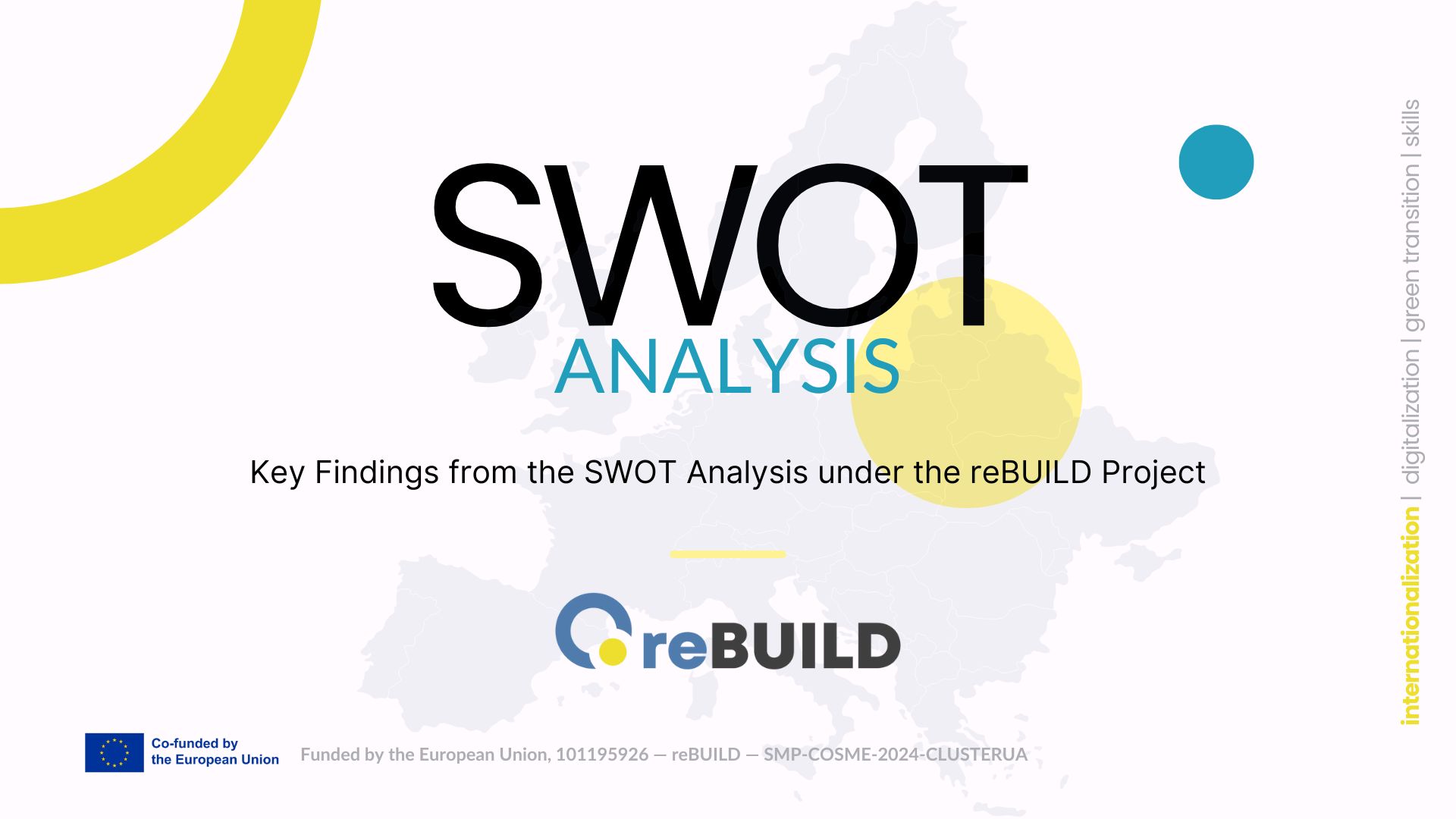Key Findings from the SWOT Analysis under the reBUILD Project

The reBUILD project is setting out to transform how EU and Ukrainian cluster managers support their member SMEs, with a focus on the construction and furniture value chains. At its heart, the initiative seeks to strengthen managerial capabilities, improve the quality and scope of support services, and help SMEs expand internationally while embracing green and digital transitions. By doing so, reBUILD aims to build a sector that is not only more competitive, but also more resilient to global market changes.
Clusters play an important role in economic development, acting as connectors between businesses, policymakers, and innovation ecosystems. The project recognizes that empowering cluster managers with modern leadership tools and strategic insight is key to enabling SMEs to navigate the complexities of international trade, adopt sustainable practices, and harness the power of digital technologies. This is especially relevant in the current context, where cross-border cooperation between EU and Ukrainian companies can open new market opportunities, drive joint innovation, and strengthen value chains against future disruptions.
Why the SWOT Analysis was conducted
Between February and July 2025, the reBUILD team conducted a SWOT analysis based on 33 interviews with cluster representatives, SMEs, and other stakeholders from Slovenia, Spain, Romania, and Ukraine.
The purpose was to identify strengths, weaknesses, opportunities, and threats to design targeted training and support measures that respond to the actual needs of the furniture and construction industries.
General Key Findings
The study shows that SMEs in the sector are fully aware of the strategic importance of integrating internationalization, digitalization, green transition and skills into their operations. However, despite this recognition, many struggle to implement these changes due to gaps in planning, funding, and the necessary skills. There is a clear need for a more holistic approach that combines these four dimensions rather than treating them as separate initiatives.
Clusters and chambers play a central role as conveners and knowledge brokers, helping SMEs navigate complex challenges. Yet, their effectiveness is often limited by the short-term and fragmented nature of available support, highlighting the need for stable, multi-year backing beyond one-off equipment grants. Similarly, training and consultancy services must be tailored to SME realities.
Across domains, SMEs express distinct needs. In internationalization, they favor packaged support combining market intelligence, legal guidance, and matchmaking services over several years, with hybrid delivery formats that mix online learning for background knowledge and in-person interactions for negotiations and cultural insights. For digitalization, practical roadmaps with modular upgrades and continuous staff training are essential, while peer networks and on-site consultancy are more effective than generic online courses. In the green transition, successful adoption requires a combination of financial incentives, clear regulatory guidance, and targeted technical assistance, with strong demand for life cycle assessment tools, standardized environmental documentation, and collaborative procurement frameworks.
Skill bottlenecks remain a major barrier, particularly in leadership, strategic planning, digital literacy, eco-design, and international marketing. SMEs rely heavily on external support, including funding, consultancy, and partnerships, to bridge these gaps. Overall, there is a strong call for structured, predictable, and multi-year support schemes, with clusters and associations positioned as key facilitators, provided they receive stronger policy and financial backing.
From analysis to action: Training Programme
To address these gaps, reBUILD is currently developing a 32-hour training programme for cluster leaders and SME employees, covering the identified themes, based on the results of the SWOT. This targeted approach will ensure that SMEs in the furniture, wood processing, and construction sectors are better prepared to compete internationally, embrace digital tools, and meet sustainability demands.
These courses will be complementary across partners, delivered online, and compiled into a “RE-SKILLING to reBUILD Guidebook” for ongoing use by cluster managers and SMEs and will be delivered using the GO Furniture META-CLUSTER NETWORKING PLATFORM: https://inevent.uk/en/SmartTransylvania/FurnitureGoInternational/form.p…
Furthermore, on 12-14 November, the 1st UP-SKILLING Exchange will take place in Ljubljana, Slovenia.
Contact info: TOMA ANDREEA | Project Manager | [email protected]
The content of this news represents the views of the author only and is his/her sole responsibility; it cannot be considered to reflect the views of the European Commission and/or the European Innovation Council and SMEs Executive Agency (EISMEA) or any other body of the European Union. The European Commission and the Agency do not accept any responsibility for use that may be made of the information it contains.
| Attachment | Size |
|---|---|
| SWOT Analysis results - reBUILD | 816.6 KB |